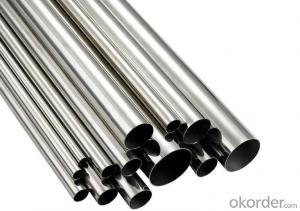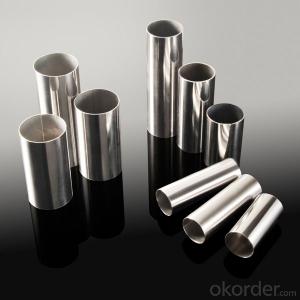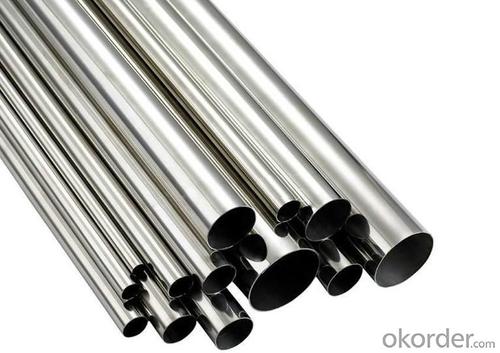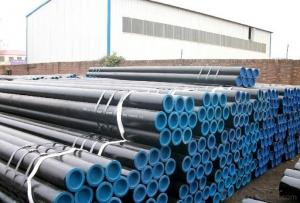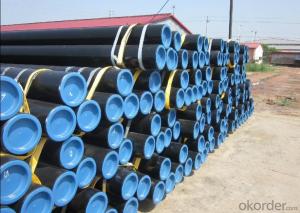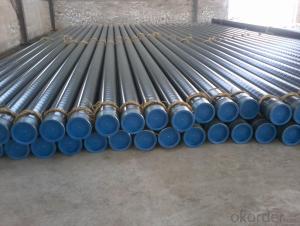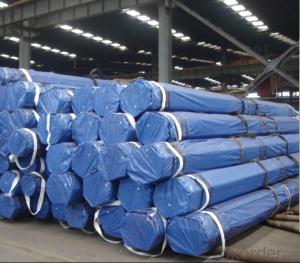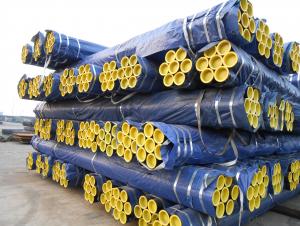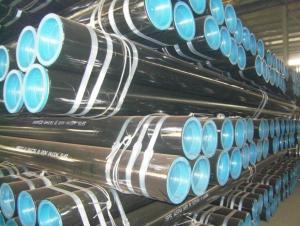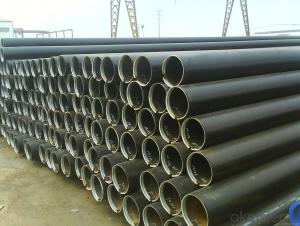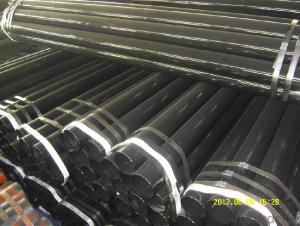ASTM A53 GrA Sch40 Carbon Steel Pipe Made in China
- Loading Port:
- Tianjin
- Payment Terms:
- TT OR LC
- Min Order Qty:
- 35 m.t.
- Supply Capability:
- 3000 m.t./month
OKorder Service Pledge
OKorder Financial Service
You Might Also Like
Specification
ASTM A53 GrA Sch40 Carbon Steel Pipe Made in China
1.Structure of Carbon Steel Pipe:
Carbon pipe is formed by drawing a solid billet over a piercing rod to create the hollow shell. As the manufacturing process does not include any welding, seamless pipes are perceived to be stronger and more reliable. Historically seamless pipe was regarded as withstanding pressure better than other types, and was often more easily available than welded pipe.
2.Main Features of the Carbon Steel Pipe:
• High manufacturing accuracy
• High strength
• Small inertia resistance
• Strong heat dissipation ability
• Good visual effect
• Reasonable price
3.Carbon Steel Pipe Specification:
Standard | GB, DIN, ASTM ASTM A106-2006, ASTM A53-2007 |
Grade | 10#-45#, 16Mn 10#, 20#, 45#, 16Mn |
Thickness | 8 - 33 mm |
Section Shape | Round |
Outer Diameter | 133 - 219 mm |
Place of Origin | Shandong, China (Mainland) |
Secondary Or Not | Non-secondary |
Application | Hydraulic Pipe |
Technique | Cold Drawn |
Certification | API |
Surface Treatment | factory state or painted black |
Special Pipe | API Pipe |
Alloy Or Not | Non-alloy |
Length | 5-12M |
Outer Diameter | 21.3-610mm |
Grade | 20#, 45#, Q345, API J55, API K55, API L80, API N80, API P110, A53B |
Standard | ASME, ASTM |
1) Material:20#(ASTM A 106/A53 GRB.API5LGRB,GB),45#,16Mn,10#.
2) Specification range:OD:21.3-610mm,WT:6-70mm,length:6-12m or according to the requirement of clients.
3) Excutive standards:GB,ASME API5L.ASTM A 106/A53,Despite of the above standards,we can also supply seamless steel pipe with standard of DIN,JIS,and so on,and also develop new products according to the requirements of our clients!
4) Surface:black lacquered,varnish coating or galvanized.
5) Ends:Beveled or square cut,plastic capped,painted.
6) Packing:bundles wrapped with strong steel strip,seaworthy packing.
4. Application of Carbon Steel Pipe
Carbon steel pipe is used for applications that require internal pressure within the pipe such as process equipment, water treatment and marine applications. Welded pipe is used for structural applications that are exposed to corrosive environments such as marine and external applications. These include handrails, poles and support piping.
5.Packaging & Delivery
Packaging Details: | seaworthy package,bundles wrapped with strong steel strip |
Delivery Detail: | 50-60days after received 30%TT or Original LC |
6.FAQ of Carbon Steel Pipe:
A. How is the quality of your products?
Our products are manufactured strictly according to national and internaional standard, and we take a test on every pipe before delivered out. If you want see our quality certifications and all kinds of testing report, please just ask us for it.
Guaranteed: If products’ quality don’t accord to discription as we give or the promise before you place order, we promise 100% refund.
B.How about price?
Yes, we are factory and be able to give you lowest price below market one, and we have a policy that “ for saving time and absolutely honest business attitude, we quote as lowest as possible for any customer, and discount can be given according to quantity”,if you like bargain and factory price is not low enough as you think, just don’t waste your time.Please trust the quotation we would give you, it is professional one.
C.
Why should you chose us?
Chose happens because of quality, then price, We can give you both.Additionally, we can also offer professional products inquiry, products knowledge train(for agents), smooth goods delivery, exellent customer solution proposals.Our service formula: good quality+good price+good service=customer’s trust
SGS test is available, customer inspection before shipping is welcome, third party inspection is no problem.
Any question, pls feel free to contact us !
7. Carbon Steel Pipe Images:
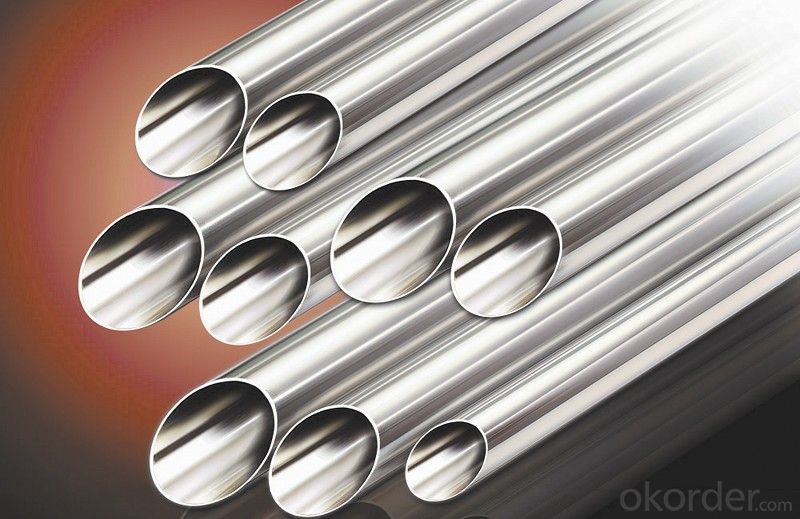
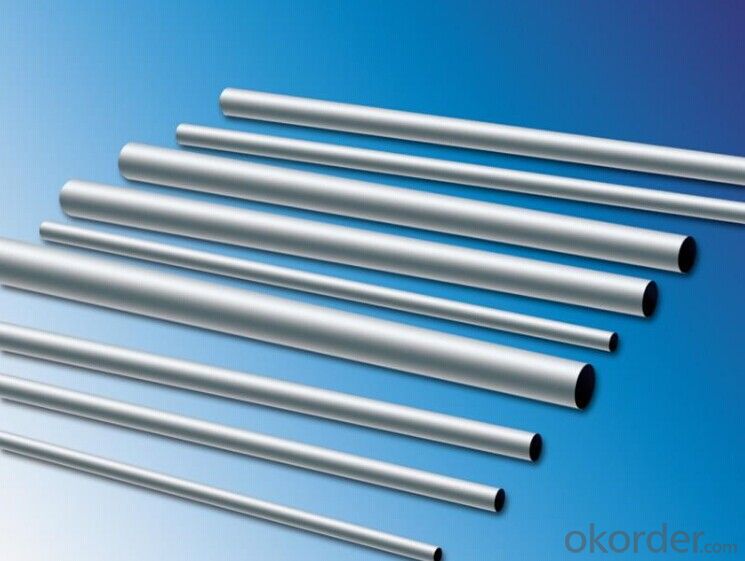
8. Company Information:
CNBM International Corporation (CNBM International) is the most important trading platform of CNBM Group Corporation, a state-owned company under the direct supervision of State-owned Assets Supervision and Administration Commission of the State Council.
Since 2004, the trading volume of CNBM International has been doubled in 5 successive years owing to the support of superior corporations and effort of all staff. Meanwhile, we have established strategic partnerships with hundreds of domestic manufacturers and sound business relations with clients from over 120 countries. Currently, we have wholly-owned overseas subsidiaries and branches in 5 countries with a view to realize localization, which also represents an essential progress in our globalization target.
- Q: What are the different methods of coating steel pipes?
- There are several methods of coating steel pipes, including fusion bonded epoxy (FBE) coating, polyethylene (PE) coating, polyurethane (PU) coating, and cement mortar lining. These coatings are applied to protect the steel pipes from corrosion, increase their lifespan, and improve their performance in various applications.
- Q: What are the common sizes of steel pipes available?
- The common sizes of steel pipes available vary widely depending on the application, but some standard sizes include 1/8 inch, 1/4 inch, 1/2 inch, 3/4 inch, 1 inch, 2 inch, 3 inch, 4 inch, 6 inch, 8 inch, 10 inch, 12 inch, 14 inch, 16 inch, 18 inch, 20 inch, 24 inch, 30 inch, 36 inch, 42 inch, 48 inch, 60 inch, and 72 inch.
- Q: What are the different coatings used on steel pipes?
- There are several different coatings used on steel pipes, including but not limited to, epoxy coatings, fusion bonded epoxy (FBE) coatings, polyethylene coatings, and zinc coatings. These coatings are applied to steel pipes to protect them from corrosion, increase their lifespan, and improve their performance in various environments.
- Q: What are the different methods of pressure testing steel pipes?
- There are several methods of pressure testing steel pipes, including hydrostatic testing, pneumatic testing, and ultrasonic testing.
- Q: What is the weight and strength of steel pipes?
- The weight and strength of steel pipes can vary depending on the specific type and dimensions of the pipe. Steel pipes can range in weight from lightweight options used for plumbing purposes to heavy-duty pipes used in industrial applications. Similarly, the strength of steel pipes can vary, with factors such as the grade of steel and the manufacturing process influencing their strength. It is essential to consult specific specifications or industry standards to determine the weight and strength of a particular steel pipe.
- Q: Can steel pipes be used for shipbuilding?
- Yes, steel pipes can be used for shipbuilding. Steel is a commonly used material in the construction of ships due to its strength, durability, and resistance to corrosion. Steel pipes are used for various purposes in shipbuilding, including the construction of the ship's hull, superstructure, and various internal systems such as plumbing, ventilation, and fuel lines. The strength and structural integrity of steel pipes make them suitable for withstanding the harsh conditions at sea, such as high pressures, extreme temperatures, and exposure to saltwater. Additionally, steel pipes can be easily welded and shaped to meet the specific requirements of shipbuilding, making them a versatile choice for this industry.
- Q: How do you prevent corrosion in steel pipes?
- One effective way to prevent corrosion in steel pipes is by applying a protective coating, such as paint or epoxy, to the surface of the pipes. This barrier creates a physical barrier between the pipe and the surrounding environment, preventing moisture and corrosive agents from coming into direct contact with the steel. Additionally, regular inspection and maintenance of the pipes, including cleaning and repairing any damaged coating, can help identify and address potential issues before they lead to corrosion.
- Q: Can steel pipes be used for geothermal applications?
- Yes, steel pipes can be used for geothermal applications. Steel is a durable and strong material that can withstand high temperatures and pressures typically found in geothermal systems. It is commonly used for drilling wells and transporting geothermal fluids, making it a suitable choice for geothermal applications.
- Q: How do you calculate the pipe flow rate for steel pipes?
- To calculate the pipe flow rate for steel pipes, you will need to consider various factors. Firstly, determine the inside diameter of the pipe, typically denoted as D. Next, measure the length of the pipe, denoted as L. Additionally, you will need to know the pressure drop, ΔP, across the pipe and the fluid density, ρ. Once you have this information, you can use the Darcy-Weisbach equation or the Hazen-Williams equation to calculate the flow rate. The Darcy-Weisbach equation is commonly used for pipes with turbulent flow, while the Hazen-Williams equation is often used for pipes with laminar flow. For the Darcy-Weisbach equation, the formula is: Q = (π/4) * D^2 * √(2ΔP/ρ) Where Q is the flow rate in cubic meters per second, D is the inside diameter of the pipe in meters, ΔP is the pressure drop across the pipe in pascals, and ρ is the fluid density in kilograms per cubic meter. For the Hazen-Williams equation, the formula is: Q = C * (D^2.63) * (ΔP^0.54) * (L^0.63) Where Q is the flow rate in cubic meters per second, D is the inside diameter of the pipe in meters, ΔP is the pressure drop across the pipe in pascals, L is the length of the pipe in meters, and C is the Hazen-Williams coefficient which depends on the roughness of the pipe. To accurately calculate the pipe flow rate, it is important to ensure that the units of measurement are consistent throughout the calculation. Additionally, it is crucial to have accurate measurements of the inside diameter, length, pressure drop, and fluid density to obtain reliable results.
- Q: Can steel pipes be used for conveying slurry and slurries?
- Yes, steel pipes can be used for conveying slurry and slurries. Steel pipes are commonly used for various applications including transporting fluids, gases, and solids. They are known for their durability, strength, and resistance to corrosion, making them suitable for handling abrasive materials like slurry and slurries. Steel pipes are often lined with materials such as rubber or ceramic to provide additional protection against wear and tear caused by the abrasive nature of slurries. The choice of steel grade and lining material depends on the specific requirements of the slurry being conveyed, such as its particle size, concentration, and temperature. Overall, steel pipes are a reliable and efficient option for transporting slurries in various industries including mining, wastewater treatment, and chemical processing.
Send your message to us
ASTM A53 GrA Sch40 Carbon Steel Pipe Made in China
- Loading Port:
- Tianjin
- Payment Terms:
- TT OR LC
- Min Order Qty:
- 35 m.t.
- Supply Capability:
- 3000 m.t./month
OKorder Service Pledge
OKorder Financial Service
Similar products
Hot products
Hot Searches
Related keywords
